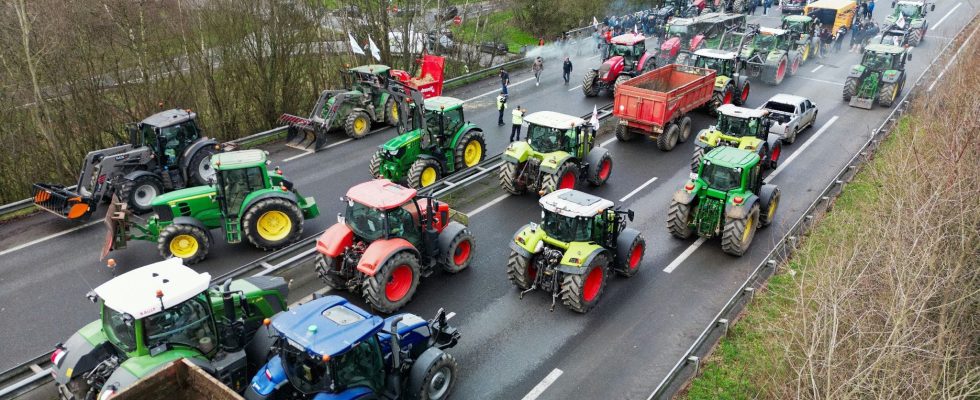Faced with his first crisis since his appointment, Gabriel Attal must go to farmers this Friday, January 26 to make “concrete proposals for simplification measures”, in the company of the Minister of Agriculture Marc Fesneau, we learned. with the latter’s office. According to the FNSEA, he will go to Haute-Garonne in the afternoon, where the first highway blockade began a week ago.
Arnaud Rousseau, president of the largest agricultural union, requested, among other things, the payment of aid from the Common Agricultural Policy due since October, or even compensation linked to avian flu, and warned that the movement would grow if farmers – around 55,000 demonstrators counted on Thursday – considered the government announcements insufficient.
Time is running out all the more for the government as the “unions risk being overwhelmed if the wait is too long”, alerted the intelligence services in a note consulted by AFP, stressing that “the risks of unrest to public order are real”.
Met in multiple places in France by AFP, the farmers have various demands, depending on whether they are poultry breeders hit by avian flu last year, wine growers whose wines sell less, or organic growers with shunned vegetables. by the French, or large cereal growers, like Thierry Cazemajou, who grows sweet corn and green beans for a major canned brand in Sigalens in Gironde. For him, “GNR (non-road diesel) is really a priority, an essential reduction: we should go back to 80 cents excluding taxes while we buy it at 1.20 euros, it’s urgent, that is weighing us down!”
Others want a minimum price for their products, or the payment of long-overdue aid or compensation, or even a moratorium on the ban on pesticides, as recently requested by the FNSEA. Some of the 140 demands put forward by the majority union require a law or negotiations in Brussels.
Block major roads
Across the country, demonstrators attacked state symbols and supermarkets on Thursday, giving the image of radicalizing anger. Without intervention from the police at this stage, the Minister of the Interior, Gérald Darmanin, estimated on TF1 that the farmers did not attack the police or the gendarmes, and did not set fire to public buildings.
In Agen, demonstrators dumped tires, plastic, crates and manure in front of the station, while another team blocked the tracks. A wild boar was hanged in front of a Labor Inspectorate building. In Bordeaux, farmers lit fires of straw and pallets in front of the prefecture and the departmental council, and dumped manure in front of the regional hotel. In Oise, around a hundred farmers spent another night on the A16 motorway, waiting to see if they will push to Paris on Friday. South of Lille (North), demonstrators blocked traffic on the A1.
“The goal is to block the main roads to stop all the wholesale goods that are moving in the territory,” Charles Demeyer, endive producer in the North, told AFPTV. “By stopping France like that, maybe we will have answers.” Renaissance MP Jean-René Cazeneuve was floured by a farmer after heated exchanges on a dam on Isle-Jourdain (Gers).
And ecology?
The Ministers of Agriculture and the Economy will lead this Friday, at 11 a.m., a committee to monitor commercial negotiations between large retailers and their suppliers, intended to protect producers’ income. The demonstrations also brought to the forefront projects for free trade agreements, notably between the European Union and Mercosur, which brings together South American commercial powers, and which is opposed by a large part of the class. French politics. In France, food imports are increasing, without having the same standards on pesticides, for example.
While farmers are also mobilized in Germany, Belgium, Poland and Switzerland, the movement is popular in France, but not all unions are calling for slashing environmental standards. The Confédération paysanne, the 3rd representative union, classified on the left, offers solutions that are very different from those of the FNSEA, Young Farmers and Rural Coordination unions. Two experts who sit with the FNSEA on environmental councils also confided to AFP their astonishment at the union’s sudden outbidding.
